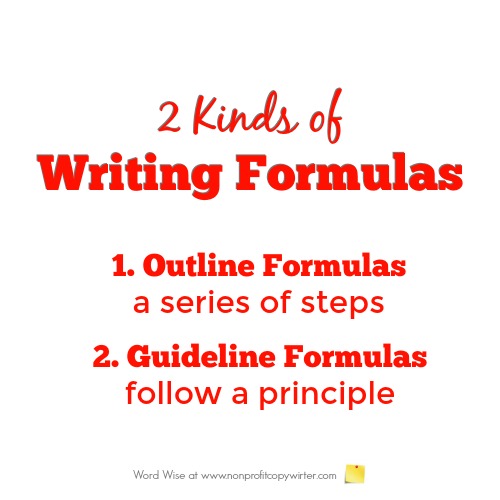Save Time: Get 5 Simple Writing Tips
you can put to use in 10 minutes
Formulas for Writing: Use the Right Tool for Your Writing Project
Award-winning writer Kathy Widenhouse has helped hundreds of nonprofits and writers produce successful content , with 750K+ views for her writing tutorials. She is the author of 9 books. See more of Kathy’s content here.
There are dozens of formulas for writing. Which ones should you use? Do they all work for each project?
When I first started writing, I found that the sheer number of writing formulas overwhelmed me. Rather than helping me to save time and be more efficient, I was confused.
Formulas for Writing Have Two Different Functions
Writing formulas are grouped into two broad categories: outline formulas (that serve as a type of template to use as you write) and guideline formulas (that serve as a principle to follow as you write).
The trick is to know when to use which type of formula.
1. Outline Formulas
It is this form you may most commonly think of when you hear the word “formula,” thanks to your high school chemistry and algebra teachers. An outline formula offers a series of steps or bullet points to follow as you write - like a general outline or template.
The 4 Ps, for instance, provides a sequential framework for a sales letter or even an article: Picture, Promise, Proof, Push.
When should you use outline formulas?
When you need a structure to follow for a writing project
2. Guideline Formulas
These formulas do not offer a step-by-step structure, but rather provide a key foundational principle to use as you write. For instance, the SELWAB formula (Start Every Letter With A Benefit) acts as a filter when you write leads, reminding you to offer a benefit to the reader at the beginning of the letter.
When should you use guideline formulas?
As a guide when you write and as a self-check as you edit and proofread
Making Sense of Formula Names
While we’ve cleared up function, it’s easy to confuse different kinds of formula names. This explanation may help.
Acronym Names
An acronym is an abbreviation. It is made up of the first letter of each word in a name and making a new name out of it, such as NASA (National Aeronautics and Space Administration), DIY (Do It Yourself), or AKA (Also Known As). A good example of a copywriting outline formula acronym is AIDA: Attention – Interest – Desire – Action. A guideline formula acronym is SMIT (the Single Most Important Thing.)
Mnemonic Names
A mnemonic (neh-MAH-nik) is a memory device – a word, phrase, or sentence that helps you remember a message or group of objects. The most readily-known mnemonic is the A-B-C song. A good example of a mnemonic writing formula is the 4 U’s. It’s a checklist that reminds you to make sure your headline content is Useful, Urgent, Unique, and Ultra-Specific. Another mnemonic formula: A FOREST.
Descriptive Formula Names
Some formulas are labeled with descriptive terms (like Star-Chain-Hook) or even using proper names (Bob Stone’s Copywriting Formula.)
More about Copywriting Formulas
1-2-3-4 Copywriting Formula: answer 4 simple questions for great content....
How To Create a Lead Magnet: A Simple Writing Formula ...
Use A FOREST as a Persuasive Writing Checklist ...
The PAS Copywriting Formula: It’s Especially Good for Social Media ...
Star-Chain-Hook: A Simple (and Persuasive) Content Writing Formula ...
Understanding Writing Formulas: How they work and why they work ...
SMIT: a writing formula to help you find the main idea of your piece ...
3 Appeal Letter Copywriting Formulas...
Use the AIDA Formula to write great content ...
Bob Stone's 7-Step Copywriting Formula ...
The 4 Ps: a writing formula and a persuasive writing tool ...
The SELWAB Formula: great for writing leads and headlines ...
5 Proven Headline Formulas ...
See more on our Writing Formulas Pinterest board...
Return from 2 Kinds of Formulas for Writing to Nonprofit Copywriter home
As an Amazon Associate I earn from qualifying purchases.
Share This Page

Named to 2022 Writer's Digest list
BEST GENRE/NICHE WRITING WEBSITE


Stop Wasting Time!

Grab your exclusive FREE guide, "5 Simple Writing Tips You Can Put to Use in 10 Minutes or Less"











